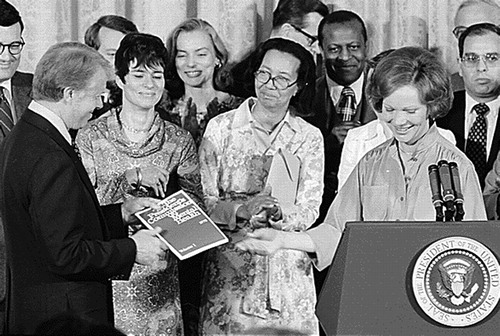Center Commemorates Carters' Pioneering MH Initiatives

Atlanta likely boasts the only presidential library with a major focus on mental health. That distinction is due to Rosalynn Carter, the wife of former President Jimmy Carter. She carried her concerns about mental health services from Georgia to the White House.
Photographs and text in “Partner of the President,” a section of the Jimmy Carter Library and Museum, tell of the former First Lady's work with the President's Commission on Mental Health (the Carter Commission) and her efforts to ensure passage of the Mental Health Systems Act in 1980.
Carter and commission members held meetings throughout the country at which they listened to the advice of psychiatrists, mental health professionals, governmental officials, family members, and patients before coming up with their recommendations.
Rosalynn Carter also is credited with helping to establish the Office of Prevention at the National Institute of Mental Health and with the development of community health care training programs.
At the Carter Center, next door to the library, her advocacy continues.
She and others founded the Mental Health Program in 1991 with the aims of reducing stigma and discrimination; achieving equity for mental health care comparable to other health care; advancing promotion, prevention, and early intervention services for children and their families, and increasing public awareness worldwide about mental health and mental illness.
The program was preceded by establishment of the annual Rosalynn Carter Symposium on Mental Health Policy in 1985. Held every November, the program in 2004 focused on “Transforming Mental Health for Children and Families in the Light of the President's New Freedom Commission [Report].”
Earlier that year, the annual Rosalynn Carter Georgia Health Forum was devoted to the implications for state governments of the New Freedom Commission report.
The Carter Center hosted the Inaugural World Conference for the Promotion of Mental Health and Prevention of Mental and Behavioral Disorders in 2000.
Staff of the Mental Health Program are advised by a task force that includes former APA President Mary Jane England, M.D., as well as psychiatrists Renato Alarçon, M.D., William Beardslee, M.D., and Carl Bell, M.D.
The Carter Center was founded in 1982, in partnership with Emory University, by Jimmy and Rosalynn Carter to advance human rights and alleviate human suffering.
In more than 65 countries, the center operates programs that address such diverse goals as increasing grain production, mediating disputes, and preventing disease.
Although the Carter Center itself is not open to the public, the nearby presidential library offers a good opportunity to look back on the former president's climb to the White House, his accomplishments, and the problems he faced.
“Race to the White House” recounts Carter's surprise victories over more famous politicians in the state primaries that led up to his presidential nomination in 1976.
“Peace in the Middle East” recalls the hope of the 1978 meetings at Camp David in Maryland, where Egyptian President Anwar Sadat and Israeli Prime Minister Menachem Begin began the discussions that resulted in a treaty of peace between the two nations in 1979.
Periodically, the library offers special exhibitions and hosts speakers on topics related to the Carter presidency.
In May a collection of Chinese embroideries will be on exhibit. The collection includes 32 pieces by Gu Wenxia, Grand Master Embroiderer of China, and her protégé.
The exhibition will take place nearly 25 years after Carter signed a cultural agreement between the United States and the People's Republic of China.
The Jimmy Carter Library and Museum are located at 441 Freedom Parkway. More information is available by phone at (404) 865-7100 or online at<www.jimmycarterlibrary.gov>.▪



